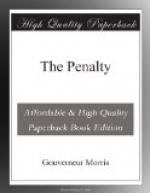Wilmot not only kept his temper, but outstayed his antagonist. The latter gone, he turned upon Barbara, and she in mock terror held up her hands for mercy; but Wilmot was not in a merciful mood.
“When you imagine that you are uplifting the cause of art, Barbs, are you sure that you aren’t debasing it? You won’t marry a man who has always loved you. Art. You put marble and bronze higher than little children. Art. You allow disreputable, unwashed men to talk in your presence as that man talked. Art. You hire people of bad character to sit for you, and people of no character. All art. You treat them in a spirit of friendliness and camaraderie. You affect to place art above all considerations; above character, above morals; worse, you place it above cleanliness.
“A man—yes, take him for all and all, a man—eats out his heart for you; desires only to live for you, only to die for you, only to lie at your feet afterward—that is nothing to you. You do not even care to listen. You would rather hear through a braggart, indecent mouth that ought to be sewed up what Rodin said about Phidias. It seems finer to you to be an artist than a woman, and you so beautiful and so dear!”
Barbara made no answer. She looked a little hurt, possibly a little sullen. She had a way of looking a little sullen (it did not happen often) when she could not hit upon just the words she wanted to express her thoughts. She felt that her attitude toward life was almost entirely right, almost entirely justifiable, and she wanted to explain exactly why this was thus, and couldn’t. So after a silence she said:
“Oh, I’m just a little pig. Why bother about me? And besides, it’s no use.”
“Don’t say that, Barbara. There must be use in it. Don’t you know in your heart that some day you are going to marry me?”
“No,” she said. “Sometimes I’ve thought so, but I don’t know it.” She selected an arrow from her quiver, touched the point with venom, and because she had not enjoyed being scolded shot it into him. “And at the moment I don’t think so.”
Wilmot spoke on patiently. “Every true lover, Barbs,” he said, “comes in time to the end of his patience and the end of his endurance.”
“And then he ceases from loving—and troubling.”
“He does not. When he knows as I know what is best for her happiness and for his, and when he finds that humbleness, and begging, and gentleness, and persuasion are of no avail—why, then if he’s a man he makes her love him, makes her marry him.”
“I hope, my dear Wilmot,” she said, “that you are speaking from a very limited experience.”
“From the experience of ten million years. I have only one life to live. Somehow I will make you love me, make you belong to me. Just because I eat with a fork, do you think my heart is really any different from that of the cave-man from whom it descended to me, or that your heart is any different from that of the girl he wanted, who kept him guessing and guessing until he couldn’t stand it, and then turned and ran and ran through the woods, and swam rivers and climbed trees and jumped down precipices until he caught her?”




